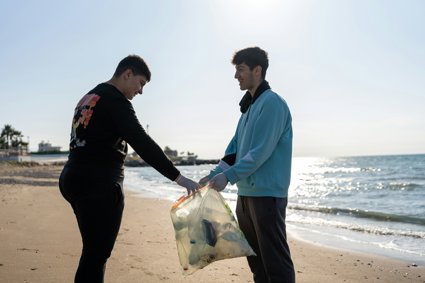
Lessons 6, 7 & 8 - Advocate for Our Oceans
This series of lessons explores the actions in which geographers can take to engage with and protect the oceans for a more sustainable future. There is an opportunity to develop pupils’ collaboration and presentation skills through debate.
Learning goals
- To understand the role international organisations and governments can work together for change.
- To consider why international decisions and agreements can be challenging.
- To think about how individuals can help conserve the oceans.
- To create a campaign to help people understand how they could help conserve the oceans.
Learning outcomes
Greater Depth:
Pupils will be able to look at how people can collaborate on several levels. They will be able to extract key points from a range of resources to support a factually well written presentation. They will be able to formulate clear questions to those who may have a different opinion to their own and devise ways to work collaboratively. They will be able to clearly present their own ideas.
Expected Level:
Pupils will be able to see how countries can work collaboratively. They will be able to formulate a well-researched piece of writing using several resources. They will also be able to pose questions to those who may have a different opinion to their own. They will be able to present their own ideas.
Working Towards:
Pupils make some connections between places. They can present an argument based on some resources. They will be able to formulate some questions. They will be able to present an idea.
Support:
Pupils will be able to identify some methods in which people can work together. They can present their ideas, but they may be factually limited or incorrect.
Suggested learning activities
Lessons 6 & 7
If possible, set your classroom up as a horseshoe for the next few lessons.
Starter
Provide each group (2-3 pupils in each) with a fact sheet about their country. Give them time to be able to identify the key parts of their place as well as an opportunity to learn more / ask questions. Atlases would be helpful for them to find out more information on their country.
Main 1
Play the (video provided and vetted) to introduce how governments help to try and make decisions for the planet. Explain that the next few lessons will be to create a ‘model’ UN (MUN) where they will need to represent their country in the motion of; how do we conserve our oceans?
Create a class charter (rules of debate)
Main 2
Use the fact sheets to pull out information to help support how they are going to approach this motion. Atlases again will be helpful for additional facts.
Pupils then spend the lesson preparing a speech to present to in the next lesson. They should build in an opinion on how we are connected to the ocean.
As a challenge task, pupils could think of questions they wish to pose to opposition countries on how they could work together.
Plenary
Ask the teams to sum up their view in one sentence. They can speak it or write it down on a mini whiteboard depending on time.
At the start of Lesson 7. Remind the class the agreed charter. Start the MUN with the teacher being the General Secretary so that the charter can be adhered to. Each group then takes it in turn to present their motion on how to conserve the oceans. After the presentations, take any questions from the class based on the challenge task.
Lesson 8
Starter
Pupils think about reasons why it is hard to always agree on the best way forward in international decision making.
Main 1
Show the class the slides with images about activism then the two campaign videos from Oluwaseyi and Finlay. Pupils then note down how they could get their voices heard.
They then spend the rest of the lesson creating their campaign. This could be displayed later in the class/school. Take this time to reflect why campaigning helps us connect to the ocean.
Plenary
Pupils go back to the mind map they started in lesson 1 and using a different colour add on what they now know.
File nameFiles
File type
Size
Download
I can See the Sea - Lessons 6,7&8 local actions global impacts - Advocate for Our Oceans (1)
.pptx
7 MB
